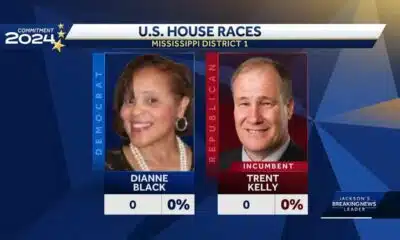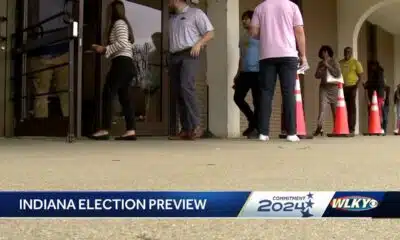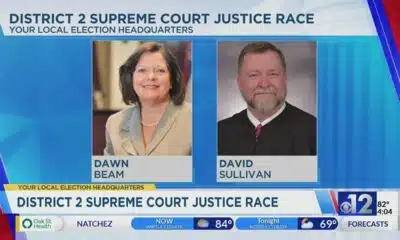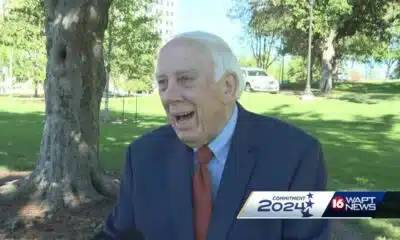Mississippi News
In Mississippi, Christian forgiveness does not equate to felony voting reforms
In Mississippi, Christian forgiveness does not equate to felony voting reforms
As Haley Barbour faced an onslaught of criticism for pardoning dozens of people convicted of felonies as his tenure as governor ended in 2012, he cited his Christian beliefs for his actions.
“Christianity teaches us forgiveness and second chances. I believe in second chances, and I try hard to be forgiving,” the former governor said soon after leaving office of the more than 200 acts of clemency he granted.
During his eight years as governor, Barbour, like most other Mississippi politicians, did nothing to make that forgiveness more inclusive by creating a system that would make it easier for the literally tens of thousands of people convicted of felonies to have their voting rights restored.
Most Mississippi politicians wear their Christianity on their sleeve. The primary tenet of the Christian faith is forgiveness and redemption. Yet, they do not see as part of that forgiveness and redemption the restoration of voting rights for people convicted of felonies.
Multiple studies have made the argument that restoring voting rights increases the odds that people who have been convicted of felonies will become productive members of society.
Dennis Hopkins, a 46-year-old Potts Camp resident who lost his right to vote as a teenager when he was convicted of grand larceny, but is now a productive member of the community in the north Mississippi hamlet, explained to lawmakers the importance of voting.
“Voting to me is everything,” Hopkins said in 2021 during a legislative hearing. “I tell my kids how important the vote is … it shames me to tell them I can’t vote.”
The old adage that the judicial system moves slowly has never been truer than when it comes to Mississippi’s one-in-the-nation system of preventing people convicted of certain felonies from regaining their voting rights.
On Sept. 25, 2021 (more than 10 months ago), the entire panel of the 5th Circuit Court of Appeals heard arguments about whether Mississippi’s felony disenfranchisement is unconstitutional. Seventeen judges heard the argument at the federal courthouse in New Orleans. It is not an everyday occurrence for the entire panel to hear oral arguments, so the assumption was that the federal appeals court was placing a priority on the issue.
But since that September day, there have been crickets from the court.
At some point, the court finally will issue a ruling.
In Mississippi, people with felony convictions must petition the Legislature to get a bill passed by a two-thirds majority of both chambers to regain voting rights. Normally only a handful (less than five) of such bills are successful each session. There is also the option of the governor granting a pardon to restore voting rights. But no governor has granted pardons since Barbour in 2012.
For a subset of those who lose their rights, the courts can expunge their record. In some instances that expungement includes the restoration of voting rights and for others it does not. It just depends on the preference of the judge granting the expungement.
During the 2022 session, legislation was passed clarifying that the judicial expungement would always include the restoration of voting rights. That modest legislation would have been the biggest change to the state’s felony voting system since it was incorporated into the Mississippi Constitution in 1890. But it was vetoed by Gov. Tate Reeves.
The U.S. Supreme Court in past decisions has given the states broad leeway in stripping the right to vote for those convicted of felonies. But it is worth pointing out that Mississippi is in a distinct minority of states (less than 10) not automatically restoring voting rights at some point after a sentence is completed.
The aforementioned 5th Circuit is considering the argument that the Mississippi felony voting ban is unconstitutional because it was placed in the 1890 state Constitution as one of many provisions intended to prevent African Americans from voting. If it was done for racial reasons, then it should be unconstitutional, the proponents of the lawsuit argue. Mississippi Attorney General Lynn Fitch opposes the lawsuit.
In the 1890s, the Mississippi Supreme Court wrote the disfranchisement of people of specific felonies was placed in the Constitution “to obstruct the exercise of the franchise by the negro race” by targeting “the offenses to which its weaker members were prone.” The crimes selected by lawmakers to go into the provision were thought by the white political leaders at the time as more likely to be committed by African Americans. They also imposed poll taxes, literacy tests, segregated schools, a ban of mixed race marriages and other racist provisions into the Constitution.
They, of course, took all of those steps in the name of Christianity.
This article first appeared on Mississippi Today and is republished here under a Creative Commons license.
Mississippi News
Death toll from catastrophic Texas flooding passes 100
SUMMARY: Catastrophic flooding in Texas over the July Fourth weekend killed at least 104 people, including 28 children, mostly near Camp Mystic, a century-old girls’ summer camp in Kerr County. Search-and-rescue teams continue to search swollen rivers for dozens still missing; officials expect the death toll to rise as more rain threatens the saturated area. Many victims were swept from cabins by flash floods early Friday, some clinging to trees. Authorities will investigate warnings and evacuation delays, noting poor cellphone service hindered alerts. Despite warnings issued before the flood, some residents didn’t receive them. President Trump plans to visit the state.
The post Death toll from catastrophic Texas flooding passes 100 appeared first on www.wjtv.com
Mississippi News
LIVE: Officials give updates on Texas floods
SUMMARY: Crews in central Texas continue searching for victims after catastrophic July Fourth weekend flooding killed over 80 people, including 27 campers and counselors at Camp Mystic along the Guadalupe River. The floods, some of the worst in decades, struck overnight, sweeping away tents and cabins. With more rain forecast, authorities warn the death toll may rise as many remain missing. Survivors described clinging to trees or fleeing to attics. Officials face scrutiny over flood warnings and emergency response. President Trump declared Kerr County a disaster area, pledging support while criticizing FEMA’s performance.
The post LIVE: Officials give updates on Texas floods appeared first on www.wjtv.com
Mississippi News
Texas floods: At least 51 dead, 27 girls still missing as search efforts continue
SUMMARY: A devastating flash flood struck a summer camp along Texas’ Guadalupe River, killing at least 51 people, including 15 children, with many missing, mainly from Camp Mystic. The floodwaters surged 26 feet in 45 minutes early Friday, washing away homes and vehicles. Rescue teams face challenging terrain, using helicopters, boats, and drones to search for survivors amid debris and broken trees. Authorities are scrutinized for potential warning and preparation failures. Gov. Greg Abbott declared a day of prayer, while rescue and recovery efforts continue amid fears of additional flooding. The Hill Country’s flood-prone terrain and unexpected downpour overwhelmed campers and residents, prompting widespread grief and appeals for support.
The post Texas floods: At least 51 dead, 27 girls still missing as search efforts continue appeared first on www.wjtv.com
-
News from the South - Georgia News Feed6 days ago
'Big Beautiful Bill' already felt at Georgia state parks | FOX 5 News
-
The Center Square7 days ago
Alcohol limits at odds in upcoming dietary guidelines | National
-
The Center Square5 days ago
Here are the violent criminals Judge Murphy tried to block from deportation | Massachusetts
-
News from the South - Kentucky News Feed5 days ago
Woman arrested in Morgantown McDonald’s parking lot
-
News from the South - Texas News Feed6 days ago
Hill Country flooding: Here’s how to give and receive help
-
News from the South - North Carolina News Feed6 days ago
Raleigh caps Independence Day with fireworks show outside Lenovo Center
-
News from the South - Missouri News Feed7 days ago
Shannon County Sheriff alleges ‘orchestrated campaign of harassment and smear tactics,’ threats to life
-
Our Mississippi Home6 days ago
The Other Passionflower | Our Mississippi Home



















































